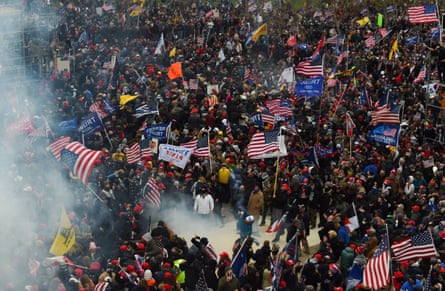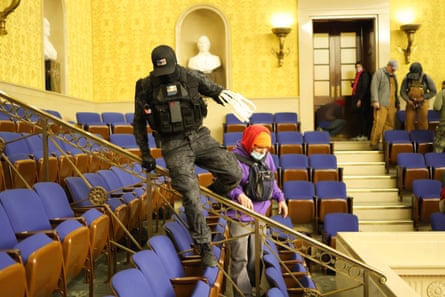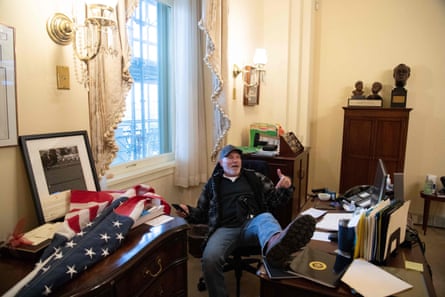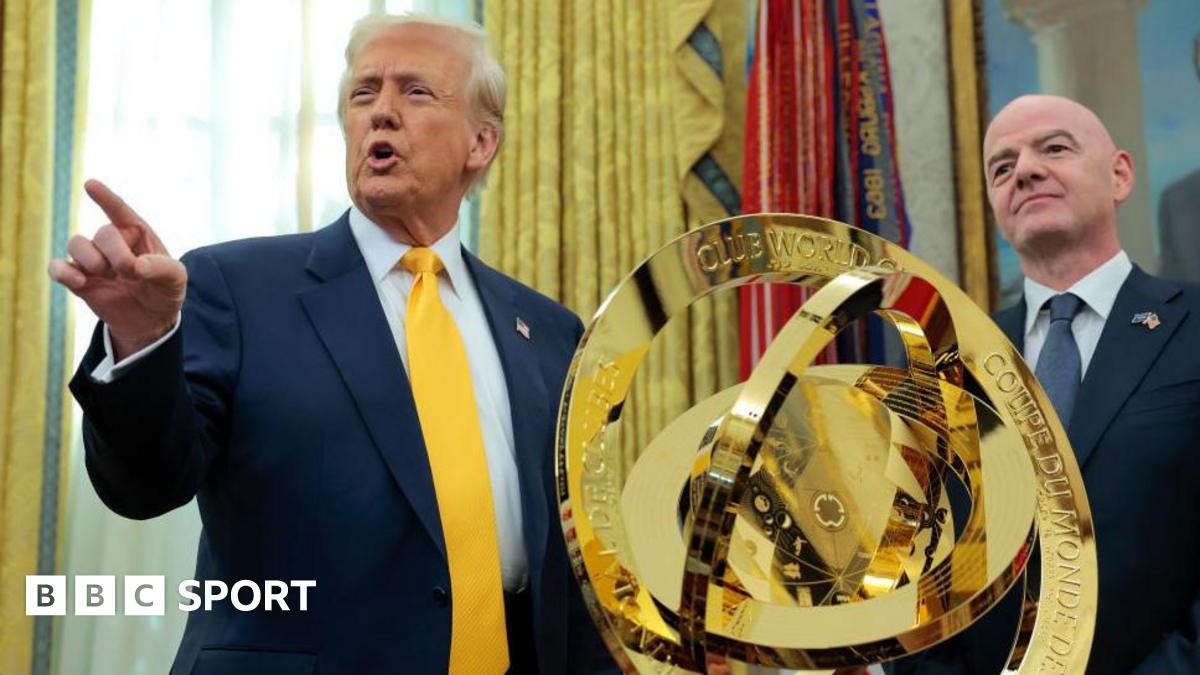When he showed up to work on 27 June, Mike Gordon was having one of the best weeks of his career.
Gordon, a federal prosecutor in Tampa, had spent the last month working on a complex case involving allegations that well-known businessman Leo Govoni stole $100m from a fund for children with special needs. That Monday, the US attorney for the middle district of Florida held a press conference announcing an indictment in the case. On Wednesday, Gordon had his semi-annual performance review and received the top rating: outstanding. On Thursday, he appeared on behalf of the government in court and successfully convinced a judge that Govoni should remain in jail until his trial.
As the end of the day rolled around on Friday 27 June, Gordon was fired.
He wasn’t given a reason for his dismissal. An office assistant simply knocked on his door while he was preparing a witness for trial, and handed him a letter that told him he was being immediately fired “Pursuant to Article II of the United States Constitution and the laws of the United States”, signed by the US attorney general, Pam Bondi. Gordon was told to turn in his devices, pack up his things and leave. The firing was so abrupt he had no chance to hand over his work to colleagues.
Even without an official explanation, there was little doubt why he was fired. From 2021 until the end of 2023, Gordon had volunteered for the team prosecuting people involved in the January 6 attack on the US Capitol. During his time working in a unit called the Capitol siege section, Gordon became known as one of the most skilled trial litigators and became a kind of coach to other prosecutors as they prepared for trials.
But on his first day in office, Donald Trump issued a blanket pardon to anyone involved in January 6.
“I got fired because I prosecuted people that this administration wanted protected. Bottom line,” Gordon said.
Trump has made no secret of his desire to exact revenge on those who investigated and prosecuted him and his allies. Scores of career prosecutors have been fired for getting in the president’s political crosshairs. Gordon’s firing is one of the best examples to date of how Trump is executing that promise and purging the justice department. It’s an attack on a fundamental pillar of the rule of law – that prosecutors should make decisions about whether and how they should bring cases without political concerns.

Even though January 6 was one of the most explosive political events in recent history, Gordon said he never had any conversations with a supervisor in which they discussed the political ramifications of what they were doing. The political implications “didn’t matter”, he said.
“What we did discuss was the importance we saw in protecting democracy and prosecuting these cases. And creating the precedent and the deterrence that political violence was unacceptable. Full stop,” he said. “And that was worth doing no matter what. It’s why I still think all these prosecutions were worth doing. Even after the pardons, even after my own firing.”
The mass firings of career prosecutors is “unprecedented”, said Max Stier, the CEO of the Partnership for Public Service, a watchdog group.
“There’s enormous discretion that prosecutors have, and there is a tradition that it’s not about winning, it’s about doing justice, and we’re watching that tradition change into it’s neither about winning or doing justice, but it’s doing the bidding of President Trump,” he said.
Two other prosecutors who worked on January 6 cases were fired on the same day. Their dismissals came after Ed Martin, a prominent defense lawyer for January 6 defendants, launched a “weaponization working group” at the Department of Justice.
Gordon and others who work with him aren’t sure why he and two other colleagues were singled out among hundreds of career prosecutors who worked on January 6 cases. The justice department did not return a request for comment on his firing.
One theory is that Gordon was targeted because he took on some of the most high-profile cases, including that of Richard Barnett, who was photographed with his feet on a desk in Nancy Pelosi’s office (sentenced to 54 months in prison), Eric Munchel, known as Zip Tie Guy (sentenced to 57 months in prison), and Ray Epps, who became the center of conspiracy theories about January 6.
In person, Gordon, who is 47 with salt-and-pepper hair, has a boyishness that belies his intensity as a prosecutor. During an interview at his home in Tampa, where an American flag was flying outside his door, he sat barefoot and in shorts, knees tucked to his chest as he recounted his time working on the January 6 cases and processing his firing.

Last month, Gordon and two other justice department employees filed a federal lawsuit challenging his dismissal, alleging that they had been wrongfully fired. A litigator in his bones, Gordon has mapped out in his head how he thinks the administration is likely to defend itself. He thinks the case will ultimately be decided by the US supreme court.
“I can tell you that I have been contacted plenty of times by colleagues from my former office who tell me that they’re all wondering, am I next? Have I done something that’s going to be on the wrong side of this administration? Am I going to be punished for some other work I’ve done?” he said.
Before he was a prosecutor, Gordon taught high school humanities and his voice still carries the boom of someone who can hold the attention of a classroom of teenagers. He does not mix up facts. When I mistakenly said Barnett, one of the defendants he successfully prosecuted, had put his feet on Pelosi’s desk, he politely responded that it had been a desk in her office. And when I repeated what I thought were the names of his two cockapoos – Cereal and Cheerio – he quietly corrected me. “Maple and Cheerio,” he said.
Gordon said he saw the January 6 riot unfold on television while he was folding laundry, four years after he joined the justice department. The prosecutor part of his brain quickly kicked in, he said: “I’m watching a crime scene, I’m watching a crime unfold. And there are all these television cameras around, which is really rare.”
In the back of his mind, he recalled something that a mentor told him as a newly minted federal prosecutor in 2017. Throughout his whole life, she told him, he had probably seen something that might be a crime and thought “somebody should do something about that”. Now, he was the person who could do something about it.
Initially, Gordon, who was working on violent crimes and narcotics cases in the US attorney’s office for the middle district of Florida, thought that he could help on some of the cases if they involved people from around Tampa. But as the federal prosecutor’s office in Washington charged with investigating January 6 began its work, more attorneys were needed and the department sent out a request for more staff. Gordon volunteered and was chosen.
Working remotely from Tampa and traveling to Washington for trials, Gordon became one of several prosecutors taking on cases as they were randomly assigned. In 2022, one of the cases he prosecuted was Kyle Fitzsimons, a 39-year-old man from Maine who wore a white butcher’s jacket and fur pelt, and carried an unstrung bow, and who assaulted five law enforcement officers in a span of about five minutes. He was sentenced to 87 months in prison.
Gordon’s performance got the attention of his supervisors and he earned a reputation as a skilled trial litigator. He was put on more trials on some of the more high-profile cases the department was prosecuting. He eventually got a new title – “senior trial counsel” – and would work with lawyers in the Capitol siege section to go over their briefs, help them prepare arguments and go to trial.
“I felt the weight of the responsibility to do it well and do it right,” he said. Taking a long pause, he added: “I felt passionate about the righteousness of what we were doing.
“I welcome the scrutiny. I’m well aware of the irony that it’s those kinds of things that are probably why I’m unemployed now, probably why I was fired, because I did take on those higher-profile things and this is the risk that sort of comes with it.”
“I mean, he worked his ass off,” said Gregory Rosen, Gordon’s boss, and the head of the Capitol siege section (Rosen resigned from the justice department in June). “He is absolutely the heavy hitter in terms of getting cases across the line and taking these high-profile cases. He doesn’t shy away easily. He’s not afraid of the limelight. And he knows how to put his head down and get through the nitty-gritty.”
Other prosecutors in the Capitol siege section would even come watch Gordon cross-examine a witness or present to a jury, said Jason Manning, a former federal prosecutor who worked with Gordon.
“Mike’s reputation for excellence in court was such that people really made time to go watch him perform,” Manning said. “You simply don’t replace people like Mike overnight.”
One of the highest-profile cases Gordon took on was that of Barnett, an Arkansas man who had become one of the most prominent January 6 rioters when he was photographed with his feet on a desk in Pelosi’s office. He also left her a note that said: “Hey Nancy Bigo was here, biatch.” Even though Barnett’s conduct was “somewhere in the middle” on the spectrum of January 6 cases, Gordon understood there would be considerable public attention on the trial.
He welcomed the opportunity to show the public how thoroughly the government had investigated the case against Barnett. He also embraced the opportunity to show that Barnett’s crime wasn’t that he merely put his feet on a desk in Pelosi’s office – he came to the Capitol with weapons: a 10lb metal pole and a stun device concealed in a walking stick, which he brandished at a police officer.
“The cross-examination got a lot of attention,” he said.

Barnett offered a litany of excuses trying to downplay his conduct on the day of January 6, at one point arguing that he had been looking for a bathroom and had wandered into Pelosi’s office. Gordon pointed out he had spent a considerable amount of time wandering around the Capitol and never asked for directions to a bathroom.
Barnett also stole an envelope from Pelosi’s office, but said he didn’t consider it a crime because it was a “biohazard” as he had gotten blood on it. He had left a quarter and said he didn’t consider it theft.
“He had a number of just patently obvious lies,” Gordon said. “It’s very clear that he had the intent, and here’s all the evidence we’ve amassed against this guy to show the public we’ve done our homework.
“People can see all the different witnesses. They can hear from Barnett himself, how he responds to cross-examination. Because folks go on friendly podcasts, they post on Twitter, there’s nobody pushing back.”
Barnett was convicted on eight counts, both felonies and misdemeanors, and sentenced to more than four years in prison.
After Barnett was sentenced, Gordon prosecuted the case against Epps, an Arizona man who was on the Capitol grounds on January 6 and, the night before, encouraged protesters to go to the Capitol. He initially wasn’t charged with a crime, but his life was upended when he became the subject of a conspiracy theory, touted by Tucker Carlson and others, that he was a federal agent. Eventually he was charged with a misdemeanor, making him one of the few people charged with a crime who didn’t enter the Capitol on January 6.
Epps eventually pleaded guilty to the misdemeanor. Gordon submitted a sentencing memo on behalf of the government that said Epps should be sentenced to six months in prison, $500 in restitution and a year of supervised release. He was eventually sentenced to a year of probation.
Gordon said the case was the hardest one he worked on.
“Figuring out what the right thing to do with the Ray Epps case was a real challenge,” he said.
“I’m well aware that not everyone agrees. But someone needed to be the lightning rod to handle that, and somebody needed to be able to handle the public appearances.”
Edward Ungvarsky, Epps’s lawyer, said that while he and Gordon disagreed on what should happen in the case, he saw Gordon as apolitical, “thoughtful” and “just very by the book”.
“He wasn’t political in the slightest,” Ungvarsky said. “I wouldn’t have known if he was a Republican or a Democrat.”
When Gordon and I first spoke shortly after he was fired, he was hesitant to go on the record because he thought there was an outside chance that he could get his job back. “It seemed so unjust. It seemed so, not only at odds with my performance, but also what I understood my reputation to be within my office,” he said. As the weeks stretched on, he said, it became clear that wasn’t going to happen.
He’s since explained to his children why he was fired. Gordon’s 10-year-old son “understands the idea that something wrong happened to me and I’m doing what I can to speak up about it and to fight back”, he said. “And he really admires that. And that’s another thing that gives me inspiration and fuel.”
These days, Gordon says that he has no regrets.
“It was the right thing to do,” he said. “I will always operate from the position that I will do the right thing first, and then I’ll worry about what the consequences of that are.”

 3 months ago
59
3 months ago
59








 English (US) ·
English (US) ·